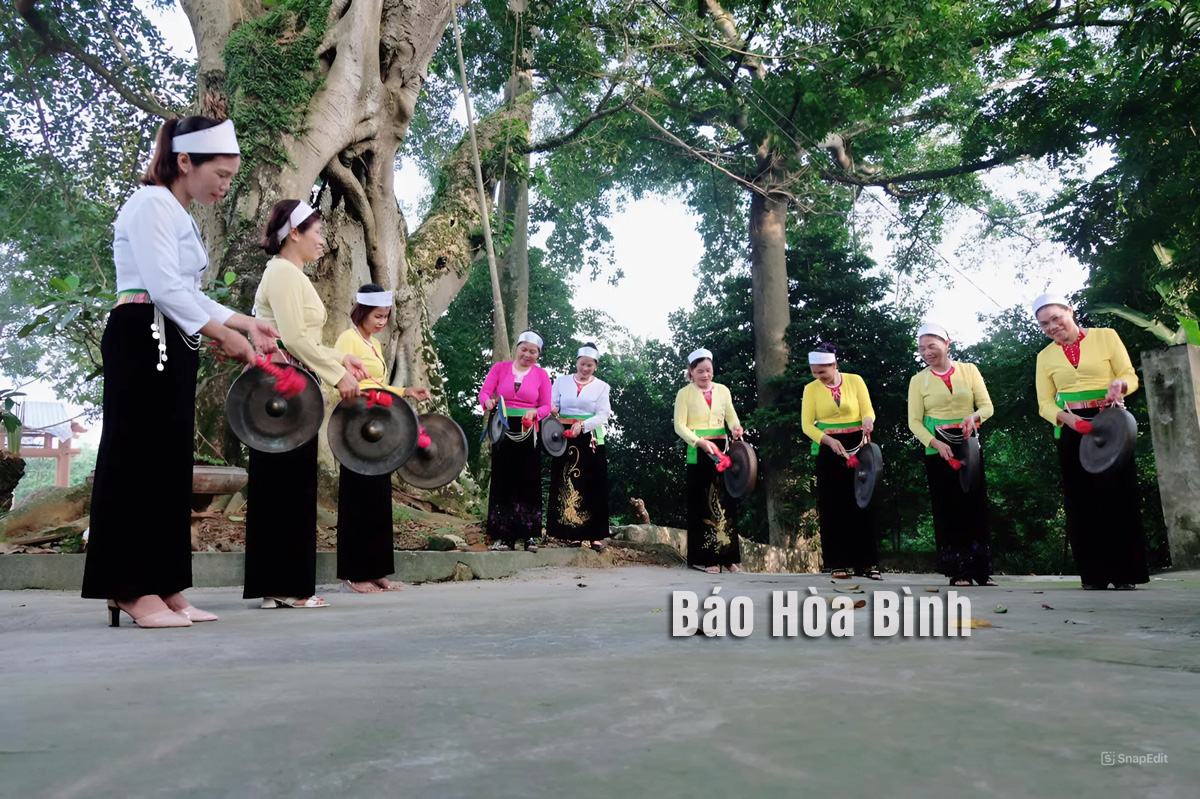
Up to 83% of Kim Boi district’s population are from ethnic minority groups. For years, the district has paid attention to the preservation and promotion cultural identities of local ethnic minority groups, particularly the Muong people.
Members of the Muong gong club in
Beo hamlet, Xuan Thuy commune in Kim Boi district practice playing gongs.
The district People's Committee has restored and organised a number of
traditional festivals such as Muong Dong festival in Vinh Dong commune, Sim
pagoda festival in Hop Tien commune, Dinh Lap festival in Kim Lap commune, Den
Ne festival in Xuan Thuy commune, Boi pagoda festival in Nam Thuong commune, Ba
Bi communal house festival in Hung Son commune, Da pagoda festival in Tu Son
commune.
The district has carried out the preservation of Muong people’s
tangible cultural heritage such as stilt houses, household items, production
tools and their intangible cultural heritage such as Mo Muong which is a great
invention of the Muong people and forms the essence of almost all the values
constituting the Muong culture in terms of history, literature, society, arts,
belief, and daily life.
Artisan Bach Thi Dao, Head of the Muong Folk Song and Gong
Teaching Club in Beo hamlet, Xuan Thuy commune, Kim Boi district said that
thanks to support of local authorities, the club was established in
2017.Now, it has over 50 members.
Whenever the club is set to perform at shows in the district or
across the province, Dao is always the first to participate and support its
members to practice.
In major events, club members joined music groups in hamlets to
together perform Muong gong. The club not only creates a useful playground, but
also contributes to preserving and promoting the traditional cultural identity
of the local Muong ethnic group.
In efforts to preserve cultural identities of minority ethnic groups, Kim Boi
district People's Committee has made a list of 29 relics and scenic sites
including the national-level archaeological relic - Dong Thech ancient tomb in
Vinh Dong commune, and seven provincial-level scenic sites.
In 2023, the district digitised information and documents about four sites -
the national-level archaeological relic Dong Thech ancient tomb, the site where
President Ho Chi Minh visited Kim Boi District Party Committee, Boi pagoda
cultural and historical relic, and Chieng communal house relic.
The district organised a training course on preserving and
promoting the value of Mo Muong cultural heritage and introduced the Muong
ethnic script to commune cultural officials and Mo Muong artisans.
Muong folk song, Muong gong and Muong folk culture clubs were
established in 17 communes and town. The clubs operate regularly and
effectively, contributing to preserving and promoting the cultural values of ethnic
minorities in the district.
It also paid attention to opening classes to teach younger
generation how to play Muong gong, or sing Thuong Dang and Bo Meng.
Nguyen Vu Hoa, head of the district’s Department of Culture and Information
said that to preserve and further promote the cultural identity of the Muong
ethnic group, the district People's Committee has promoted the outstanding
values of cultural heritages in many forms to attract visitors, and increased
cooperation with outside partners to have more resources for conservation
work.
In late March, 29 labourers from Da Bac district were sent to work as seasonal farm workers in Buyeo county, Chungcheongnam province, the Republic of Korea (RoK). Upon arrival, they quickly settled into their jobs, enjoying good working conditions and benefits, with wages aligned with the terms of their signed contracts. The programme is now being expanded, with relevant departments and sectors actively seeking additional seasonal employment opportunities in various localities across the RoK.
Luong Son Industrial Park has invested in standardised wastewater and emissions treatment systems, enforced tight emission controls, reduced noise, dust, and solid waste, and expanded green spaces, contributing to protecting the environment and promoting sustainable development.
Hoa Binh police are collecting public feedback on amendments to the 2013 Constitution via the national identification app VNeID. This innovative approach marks a giant leap towards modernising grassroots democracy and enhancing transparency in public consultation.
A total public investment capital of 113 billion VND (over 4.3 million USD) was disbursed for a project to upgrade infrastructure and stabilise residents in the vicinity of the Da River reservoir between 2021 and the first quarter of 2025, giving a facelift to local rural areas and improving the quality of people's life.
Since the end of 2023-2024 academic year, Cu Yen Primary and Secondary School in Luong Son district has deployed e-study records for all of its 500 primary students, said the school principal Nguyen Thi Tuyen.
The Labour Federation of Hoa Binh city has actively worked to protect the rights and welfare of nearly 8,000 local workers and union members at 152 grassroots unions. Through regular dialogues, education campaigns, and welfare programmes, the federation has helped foster stable, progressive labour relations.



